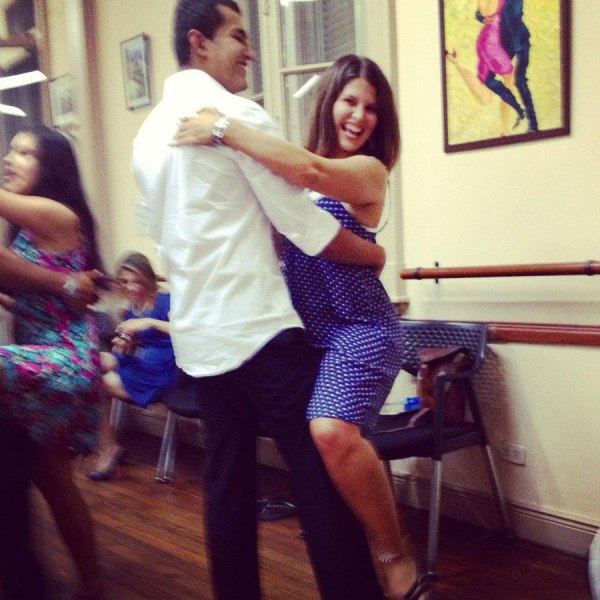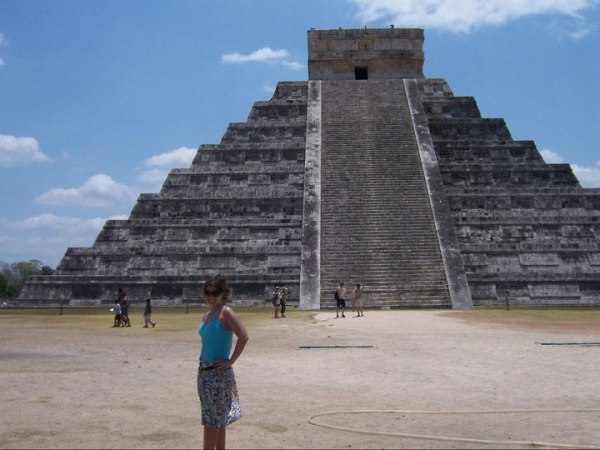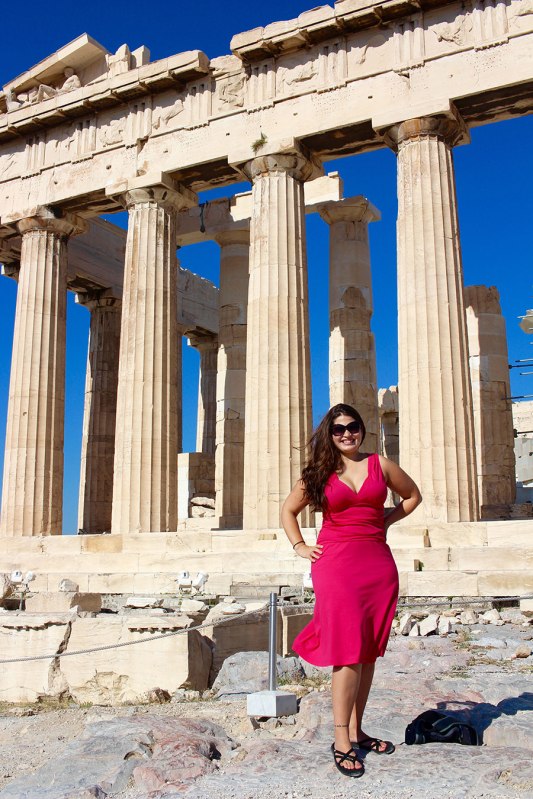 What impresses me about Amanda from Teaching Wanderlust is her solo travel spirit. She’s young, determined and passionate about traveling and teaching. And I wish I could remember how I found her, or who found who, so that just let’s you know that I’ve been reading Amanda’s blog for sometime now.
What impresses me about Amanda from Teaching Wanderlust is her solo travel spirit. She’s young, determined and passionate about traveling and teaching. And I wish I could remember how I found her, or who found who, so that just let’s you know that I’ve been reading Amanda’s blog for sometime now.
Originally from Portland, Oregon in Los Estados Unidos, Amanda now teaches in Valencia, Venezuela. As a career teacher, she’s taught all over, it seems, and has no plans on stopping.
Here she is:

// What do you like (and/or don’t like) about living abroad?
I like seeing as much of the world as I can while I’m still young. Before my grandmother died she told me that the thing she regretted the most was waiting until she was retired before she started traveling. Then she got early onset Alzheimer’s and found out that she had a rare genetic heart disorder and she couldn’t travel. Now I am teaching my way around the world so I can combine my passions for travel and education while I’m still young.
// What do you find most different about living abroad?
For the most part, teaching elementary school at an international school is the same as it is in Oregon… except that my work pays for my airfare and my apartment.
The biggest difference is my current host country of Venezuela because most things are a bit more challenging here. For example, yesterday I only had running water for three hours. Two days before I didn’t have electricity for about 12 hours. In addition to these sporadic difficulties, there is the inflation rate that rises all the time and the issues with finding basic goods like toilet paper, milk, sugar, shampoo, etc. I’m going into my third school year here and I find that people can learn to adapt to just about anything really.
// What do you miss about home (besides family and friends)?
Besides family and friends, I miss being able to walk into one grocery store and knowing that I can find just about anything I want. I usually go to an open air market plus three or four other stores every week to find basic goods. I’m not exaggerating; there are many things that I either pack with me, ship to myself, or search several stores to find. According to the official exchange rate, some condoms were recently sold for more than $700 USD.
// Is there something you feel you have gained since becoming an expat?
I wrote a long post about lessons I’ve learned after five years as an expat, but mostly it boils down to patience and resilience. Patience is something that I always knew I needed more of and living in Latin America has really helped me learn that all things happen at the right time. Living in Venezuela has taught me to be resilient and to find a way to make a DIY version or to work around what I can’t find.

// What’s a day-in-the-life of you, look like?
This is what a typical Monday looks like:
5:30- I wake up to my phone alarm to find that my fan has gone off because the power went off sometime during the night. This is why I also have to turn off my ipad alarm in a few minutes- you always need a backup!
6:00- I’ve finished dressing and doing makeup so I start boiling water for my French press coffee. Then I start cooking breakfast.
6:45- I finish reading a page in my latest book and then get ready to drive to work.
7:00- I arrive in my classroom and review my lesson plans for the day and begin answering emails.
7:45- 11:30 My third graders arrive and I start teaching. Students have a recess and snack midway but I have duty during that time.
11:30- I can finally go to the bathroom! Whoo! Then I have lunch at my desk as I get caught up on the school emails that have arrived while I was teaching.
12:00- Students go to a Specials class and I have a meeting with my PLC.
12:40- Teach
1:40- Students go to another Specials class and I have time to grade and work on lesson plans.
2:20- Teach
2:55- Students go to dismissal
3- 3:45- Teach after school activity (Dance Workout!)
3:45-4 Put students into their cars
4:15 Go home and cook an early dinner. Maybe run to a local corner store for a couple of ingredients that I couldn’t find on the weekend.
5:30 Walk to the gym where I might see a couple friends and where my personal trainer will kick my butt and then talk me into taking a Zumba-like class called bailoterapia.
7:30 Walk back from the gym and shower
8:00- Read, write my blog (http://teachingwanderlust.com/), watch a movie, or stream a TV show.
11- Convince myself that it is time to go to sleep, but usually end up reading until about midnight.
// Are there any expat or travel bloggers you particularly enjoy? Who? Why?
I love reading your blog (even though your job is a bit different from mine) because your story telling skills are top notch.
Expat Eye on Germany https://expateyeongermany.wordpress.com/ makes me crack up laughing every time I look at her blog.
I like the http://www.runawaybrit.com/ because she is an international teacher in India which is a place that I would like to work one day.
The Present Perfect https://thepresentperfect.wordpress.com/ is written by another international teacher working in a city I would ADORE working in- Budapest. She also has fantastic pictures.
Probably the blog/website I use the most is http://internationalschoolsreview.com/ because you can connect with other international teachers from all over the world.

// What’s a question you wish interviewers would ask, but never have? (Then answer the question)
If you weren’t a teacher what would you be doing instead?
I was a child support case manager for a couple of years with the Oregon Department of Justice before I started my master’s degree. I would have continued with that or switched into Social Work (I actually met a few retired teachers who were social workers so you never know!).
Thanks, Amanda!

This was a great interview with Amanda. Thoroughly enjoyed reading it, and it was interesting to hear that you have to deal with power cuts so often in Venezuela. Sounds like that might make cooking and boiling water difficult – that is, if you cook by electricity instead of gas. Sleeping at midnight is late (well…I do that too a lot)! Running on about six hours sleep and teaching class, that is quite amazing. Hopefully your students aren’t a handful 😀
LikeLiked by 1 person
I wonder how many countries have to do with power cuts on a regular basis. I know Nepal does, as do we here in Cambodia. It’s probably much more common than those who live in Western countries realize…Thanks, Mabel.
LikeLiked by 1 person
This year my students are the best I’ve ever had. As the year progresses I am getting better at going to sleep before midnight. I’m still working on it though.
LikeLiked by 2 people
Thank you for sharing the story with us, Amanda and to Lani for posting it.
Amanda, in your previous role as a Child Support Manager, do you feel that your experience has shaped your outlook and has it been helpful in your current posting in Venezuela? If so, how?
Venezuela is a country of contrast, geographically. Venezuelans are warm, friendly and generous from my experience. They have a big heart. Their love of music and dance are part and parcel of their culture. The El Sistema, The Venezuelan Music Education Model has been emulated in the US and the UK. Apart from the challenges of getting basic goods and power cuts, may I ask what has prompted you to live there for the last 3 years? Some people would not have lasted that long.
LikeLiked by 1 person
I can’t speak for Amanda, but I think as far as power cuts go, people adapt and get used to it. We have them in Cambodia and when I lived in Thailand, I lived in a house outside of town that was rustic – and well, every time we had a storm, it seemed, the power went out. Then, when I moved into town I experienced the same thing!
LikeLike
Sorry for the late reply!
While I was a Child Support Case Manager I really struggled because I put most of my energy towards my cases that had non paying parents and it was frustrating that I couldn’t help those families more. As a teacher I can immediately see the impact that I have with my students and their families.
I love Venezuela mostly thanks to the warm people and the gorgeous beaches. Also, my current school is the best school I’ve ever worked at and I just don’t want to leave. The students are fantastic, the resources available at school are abundant, and I have a full time TA for a class of 19 students.
Like Lani said, you learn to adapt to the power and water shortages. You also learn the best “bachaqueros” we can find you things and sell them at a more expensive rate when you can’t find them in the stores.
LikeLiked by 1 person
Lani, Such a good interview series, and it’s really nice to virtually get to know other expats! Amanda’s life in Venezuela sounds like it comes with challenges, but it must be wonderful or else why stay three years!
LikeLiked by 1 person
Exactly. You got it!
LikeLike
Sorry for the late reply!
When I have months like last month where I spent nearly every weekend at a beautiful Caribbean beach, it makes food and power shortages doable.
LikeLiked by 1 person
I am really loving this series! More! 🙂
LikeLiked by 1 person
I’ll try to keep them coming. Thanks for the encouragement.
LikeLiked by 1 person
I’m no longer an expat, but after spending almost twenty years abroad, I enjoy hearing about the experiences of expats. Amanda, your enthusiasm really comes through in the photos.
A great series, Lani.
LikeLiked by 1 person
Thanks. I’m enjoying them as well.
LikeLike
The lessons Amanda has learnt since becoming an expat resonate with me: patience and resilience. I like that she has found a way to work around what I can’t find. Adaptability at its best 🙂
LikeLiked by 1 person
Talk about adaptability at its best…..
http://www.boredpanda.com/hand-made-aperture-engagement-ring-box-photographer-girlfriend/?utm_source=newsletter&utm_medium=link&utm_campaign=Newsletter
LikeLiked by 1 person
Very sweet.
LikeLike
Agree! Being flexible and making things work is what keeps us alive and thriving 🙂
LikeLike
Anytime you go to a grocery store and have to wait an hour or more in line, you had better learn some patience real quick or else move on!
LikeLiked by 1 person
Great interview and thank you very much for the mention! Linda.
LikeLiked by 1 person